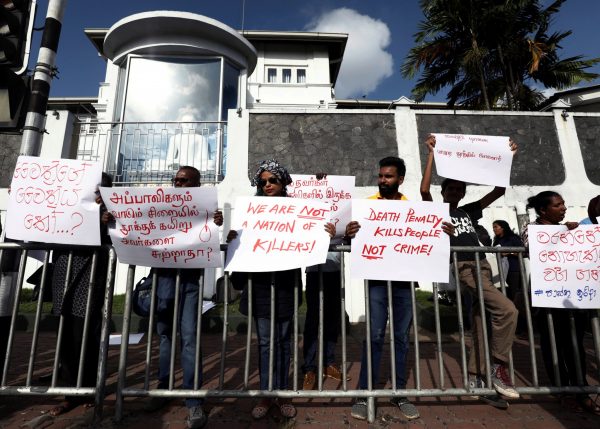Sirisena’s return to the death penalty has provoked mixed responses. Some point out that Sirisena cannot present evidence to show that the death penalty can save future generations from the scourge of narcotics and drug trafficking. His attempt to link an undisclosed drug mafia with the April 2019 Easter bombings did not prove convincing for most observers. The claim was flatly contradicted by a Special Presidential Committee appointed to probe the Easter attacks and statements issued by Sri Lankan Prime Minister Ranil Wickremesinghe. As Sirisena’s arch rival in politics, Wickremesinghe points the finger at home-grown jihadists. Linking drugs with terrorism is a familiar fable in the history of war in Sri Lanka.
Fearing that he might lose the support of his own government, President Sirisena has announced that he will declare a day of ‘national mourning’ if the government does not agree to his reinstatement of capital punishment or seeks to abolish it. For many in Sri Lankan politics, whatever the scale of the drug problem at hand, bringing back capital punishment for drug offences sounds like an over-reaction.
Legal experts point to pitfalls in the road ahead. Reinstating the death penalty requires approval both from an extremely divided national legislature and the Supreme Court. Their legal–moral appeal seems to have had some effect on Sri Lanka’s majority Sinhala–Buddhist population. But the President’s efforts to convince the public by citing blessings he received from a number of Buddhist clergymen have mostly fallen on deaf ears.
Sirisena’s move to bring back the death penalty is not out of character. Almost immediately after being sworn into office in 2015, Sirisena started a morality-inspired war against narcotics. He launched an anti-drug elite task force and increased police powers to deal with drug offenders. An island-wide anti-drug awareness campaign led to the establishment of thousands of committees in schools and villages to combat drugs. Yet in December 2018, Sri Lanka voted in favour of a final moratorium on the death penalty at the United Nations General Assembly. This vote was retracted just six months later. The background to this turn is developing dynamics in Colombo’s political settlement and the huge political stakes involved in the gamble to bring back capital punishment.
Sirisena has tied the war to his personal as well as political agenda. Like his predecessor Mahinda Rajapaksa, who won the ‘war against terrorism’, Sirisena wants to go down in history for having saved Sri Lanka in the war on drugs. One can attribute President Sirisena’s toughness and bravado of his resolve to an inspirational meeting with Philippine President Rodrigo Duterte in January 2019. This ‘toughness’ is an effort to politically re-brand himself as stronger and more powerful than Gotabhaya Rajapaksa, a competitor in the December presidential elections.
As a former defence secretary, Rajapaksa has already earned a reputation for being ‘tough on crime’. Contrary to Rajapaksa’s hard-man political image, Sirisena is often depicted as softly spoken and temple-worshipping — an ordinary man of the village. Although Sirisena has yet to officially declare his intention to contest the presidency, his decision to bring back the death penalty could be a sign that he is preparing such an announcement. Reinforcing a reputation for ‘toughness’ is vital for Sirisena given his rapidly declining public approval ratings following the disastrous Easter bombings.
The question is whether the war on drugs is winnable and whether the death penalty will help. Framing the anti-narcotics efforts as a war has been a selling point for the public who are getting weary of everyday drug abusers and dealers. Considerable political momentum was created by the ending of almost 25 years of civil war, and people are accustomed to the warfare frame of reference.
As intended, the reintroduction of the death penalty received the expected reaction from local and international civil society organisations, the United Nations and Western governments — the so-called ‘coalition of enemies’ of the majority Sinhala–Buddhist constituency. Ultimately Sirisena’s political fate will depend on this constituency, which so far seems supportive of his gambit.
Although there are no clear signs that Sirisena will be re-elected, he is making small gains by drawing political attention to himself, while distracting the electoral mass away from compelling issues of national security and economic development. Sirisena’s choice of battleground has been executed with almost military precision, reminding us of Clauzewitz’s claim that ‘war is politics by other means’.
Shyamika Jayasundara-Smits is Assistant Professor in conflict and peace studies at the International Institute of Social Studies (ISS), Erasmus University Rotterdam.

